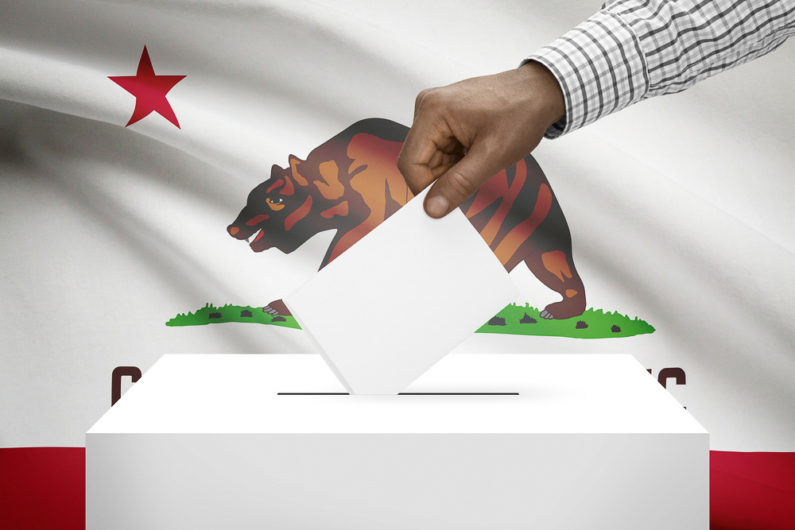New poll by Stanford scholars shows age divide among California Democrats, GOP unity issues
A new poll of California voters by Stanford University’s Bill Lane Center and the Hoover Institution shows an age divide in the Democratic Party and GOP voters slow to embrace Donald Trump.
With California’s June 7 primary only a week away, a new Hoover Institution Golden State Poll finds Hillary Clinton and Donald Trump with large leads in their respective primaries but cautionary signs ahead, and good news for Democratic U.S. Senate hopefuls Kamala Harris and Loretta Sanchez.

A week before California’s June 7 primary, a new poll of state voters by the Hoover Institution and the Bill Lane Center shows an age divide among Democrats and GOP unity issues. (Image credit: Niyazz / Shutterstock)
Hoover’s Golden State Poll, administered by the survey research firm YouGov and designed in conjunction with Stanford University’s Bill Lane Center for the American West, finds Clinton holding a 13-point lead over U.S. Sen. Bernie Sanders (51 percent to 38 percent).
Trump receives 66 percent in the Republican contest. Why that lofty number is problematic: Mitt Romney, like Trump a nominee-in-waiting, received 79.5 percent of the vote in California’s 2012 GOP presidential primary.
Clinton, meanwhile, continues to struggle with younger primary voters – Sanders leads 61 percent to 30 percent among Californians under 30 and shows weakness among “no party preference” voters, trailing Sanders by 40 points. Clinton leads among registered Democratic voters by 17 points.
Bruce Cain, the Spence and Cleone Eccles Family Director of the Bill Lane Center, said: “The huge age divide in the Democratic contest poses a serious strategic question for the Clinton campaign: Spend a lot of money now to try to offset or reduce this gap to avoid an embarrassing primary outcome that will not affect the delegate count much, or be patient, save her money and address the problem in the fall.”
Unity issues for both parties
Bill Whalen, a Hoover Institution research fellow involved in the polling, said: “The California primary may not carry the same drama and weight as it did a month ago, but this poll confirms trends that should concern both frontrunners. Republicans are slow to get on board with Donald Trump. Hillary Clinton struggles to unite her party and broaden her appeal.”
In the primary to succeed retiring U.S. Sen. Barbara Boxer, State Attorney General Kamala Harris leads with 26 percent, followed by Rep. Loretta Sanchez at 13 percent. Three Republicans – attorney Tom Del Beccaro, mediator Duf Sundheim and entrepreneur Ron Unz – receive 6 percent apiece.
If these results hold up, under California’s open primary rules, both Harris and Sanchez would advance to the general election.
The survey, which interviewed 1,700 adult (18 and up) Californians, was conducted from May 4 to May 16. The full poll results for the survey, which has a margin of error of +/- 3.47 percent for the full weighted sample, can be found here.
Other highlights
The Golden State Poll also discovered the following:
- While a plurality (45 percent) of Democrats prefer removing their party’s superdelegate category, a plurality (41 percent) of Clinton voters support keeping them.
- When asked about support for the open primary process that can produce an intra-party U.S. Senate general election, a near majority (47 percent) support keeping the election reform. But when explicitly reminded that process can send either two Democrats or two Republicans to the November ballot, support dropped to 38 percent (2 Republicans) and 40 percent (2 Democrats).
- Even among Republican voters, none of the Republican Senate candidates have emerged as a favorite (13 percent for Del Beccaro, 12 percent for Sundheim, 11 percent for Unz, and 42 percent not sure).
- Looking to November, there’s tepid support for the two likely nominees. Clinton leads Trump, 45 percent to 33 percent, with Libertarian Gary Johnson polling at 4 percent and 8 percent considering a write-in candidate.
- The lone June ballot measure – Prop. 50 – receives broad bipartisan support (58 percent Democrats; 62 percent Republicans).
The May-June 2016 issue of Eureka, a Hoover Institution online publication focusing on policy, political and economic issues confronting California, will be released in conjunction with this survey. The new issue lays out the advantages and disadvantages of Prop. 14, explores the future of political reform in California and provides an in-depth analysis of the Golden State Poll’s results.
The Hoover Institution Golden State Poll is conducted quarterly by researchers at the Hoover Institution at Stanford University, in partnership with the survey research firm YouGov. The May 2016 Hoover investigators are Carson Bruno, Lanhee Chen, Tammy Frisby and Bill Whalen, with further guidance provided by Cain.
